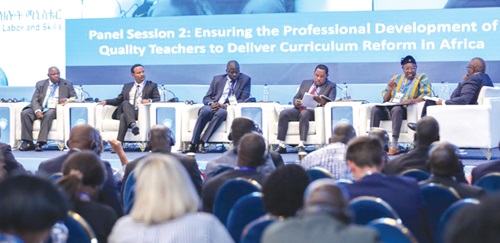At an international ministerial platform in Addis Ababa, Ethiopia, the Deputy Education Minister, Dr Clement Apaak, touted what he described as a “sweeping reform” in the education sector to boost teaching and learning programmes across the country.
The three-day summit, graced by the Deputy Prime Minister of Ethiopia, Temesgen Tiruneh, on the theme” "Educate and skill Africa for the 21st Century", convened delegations, including ministers and professionals from across the continent.
The Innovation Africa 2025 of the African ministerial summit focused on advancing education, technology and skills development across the African continent.
Teacher licensure
Building upon the African Union's declaration of 2024 as the "Year of Education," the summit brought together government ministers, policymakers and industry leaders to collaborate on initiatives that enhance educational outcomes and digital transformation in Africa.
Speaking during a panel discussion on the theme: "Ensuring the Professional Development of Quality Teachers to Deliver Curriculum Reform in Africa," the deputy minister brought up the teacher licensing and the National Training Council initiative in Ghana as one of the important reforms.
He told the audience that the examination through which one could obtain a licence sought to "ensure continuous learning throughout a teacher's career".
According to him, to ensure continuous learning and improvement by teachers, they must accumulate points through continuous professional development programmes as a basis for license renewals.
As part of the reforms, he said, colleges of education currently offered Bachelor's degree programmes in education as a means to promote reflective practice and inculcate digital pedagogy into teacher-trainee curricula.
Dr Apaak also noted that the government had launched the Teacher Deployment and Retention Programme, intending to offer allowances, housing and mentorship opportunities for educators working in underserved communities.
"Incentives and support systems are in place to encourage teachers to work in underserved areas, including allowances, accommodation and targeted mentorship," Dr Apaak said.
On the issue of knowledge sharing across the African continent, the deputy minister told the international ministerial gathering that Ghana was championing cross-border collaboration by promoting inter-country teacher exchange programmes under the ECOWAS and African Union frameworks, making digital resources freely available, and actively participating in continental teacher development platforms like the African Union’s CESA Cluster.
“Our vision extends beyond Ghana.
We believe in sharing resources, strategies and successes with our brothers and sisters across Africa," Dr Apaak said, reinforcing Ghana’s commitment to continental cooperation.

